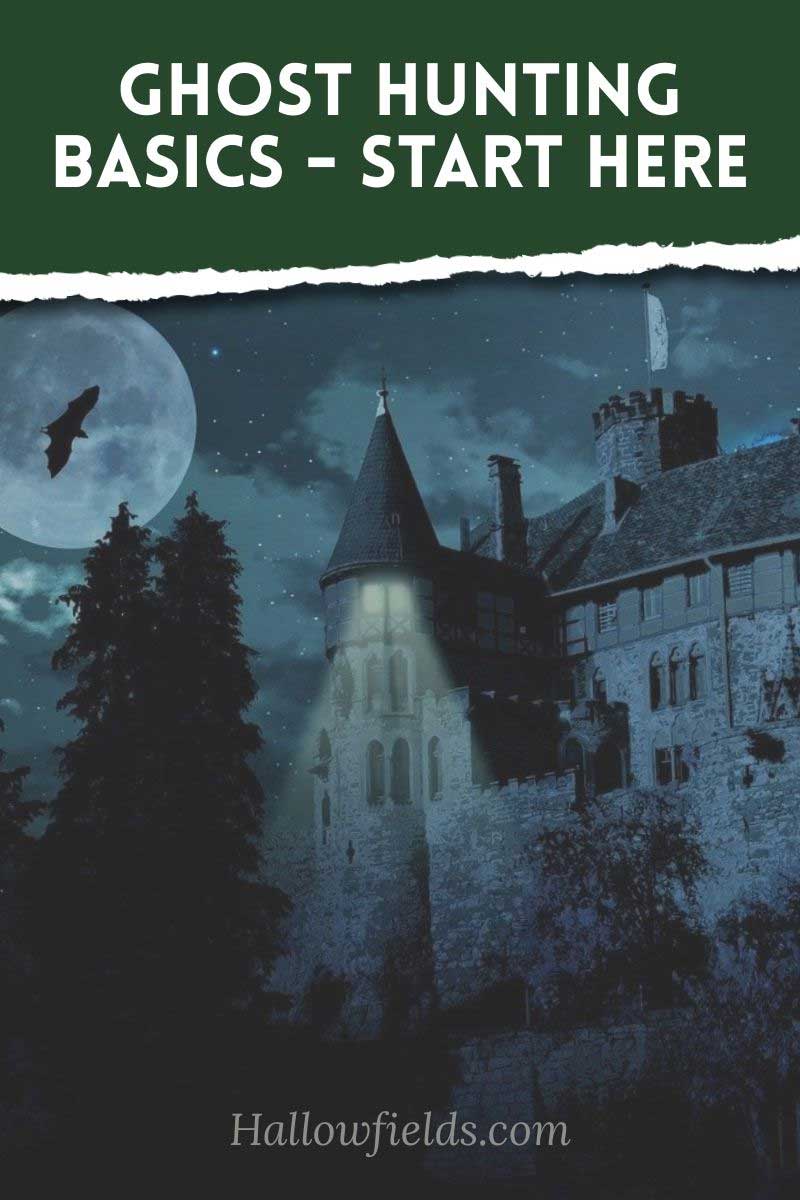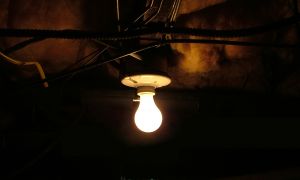As an Amazon Associate I earn from qualifying purchases. Click for details.
 This is the first lesson in my free Ghost Hunting for Beginners course.
This is the first lesson in my free Ghost Hunting for Beginners course.
You’ll learn, step by step, how to become a confident, successful ghost hunter.
Along the way, you’ll also discover best practices that can make ghost hunting fun, fascinating, and safe.
Well… as safe as one can be, dealing with unknown spirits and eerie phenomena.
So, let’s get started.
Ghost hunters and paranormal investigators
It’s important to know terms used in this kind of research.
Ghosts – the word – usually means “spirits of the dead.” We use that term – whether we’re believers or skeptics – to refer to unexplained or weird phenomena at a site that seems haunted.
Using that word loosely keeps researchers on the same page. We’re not insisting that ghosts are real. We’re investigating odd things – often called “anomalies” – that suggest something unexplained is going on.
Our job is to find an explanation for those odd experiences, if we can.
Are ghosts real? Do spirits of the deceased visit or even linger in our world? That’s up to the individual researcher to decide.
As investigators, we use the word “ghost” as a reference to possible spirits of people who lived and died in this world, in the past.
- The term “ghosts” does not include demons.
- Likewise, ghosts aren’t non-human spirits that someone summoned or conjured.
- Ghosts aren’t aliens.
- Ghosts probably aren’t doppelgangers (an apparent duplicate of a living person).
- Ghosts may or may not include poltergeists or shadow people.
Those other, non-ghost entities may exist, but – with the possible exception of poltergeists and shadow people – they aren’t part of ghost hunting. (They are part of paranormal research.)
Ghost hunters don’t actually “hunt” spirits. We hunt for evidence of ghosts, and things that can make a site seem haunted.
-
- We find out why people think ghosts may linger at the location.
- We look for our own evidence.
- We debunk as much as we can.
- Based on verified facts – and evidence we can’t debunk – we decide if ghosts are a possible or even likely, at that site.
So what’s a paranormal investigator?
Paranormal means outside (para) normal. It doesn’t necessarily mean ghosts, UFOs, cryptids like Bigfoot, faeries, and so on.
In other words, it could be anything unexpected for the location.
If you sense something odd at a “haunted” site and say, “Whoa, I didn’t expect that,” it’s possible that whatever-it-is is – literally – paranormal.
Paranormal investigators are just looking for explanations of weird, strange, and abnormal phenomena.
A paranormal investigator follows steps similar to what a ghost hunter does.
- Find a report of something unusual or abnormal.
- Research that report to see if it’s credible.
- Investigate the story in real life, to debunk or confirm some or all of it.
- Either reach a conclusion about the report, or continue researching it (and similar reports) until an answer seems clear.
So, a skeptic can be a paranormal investigator. Even someone who’s adamantly opposed to the concept of ghosts or UFOs can be a paranormal investigator.
We’re all in this together… maybe
A ghost hunter is probably a paranormal investigator. A UFO seeker is probably a paranormal investigator. A demonologist might be a paranormal investigator.
Many police become paranormal investigators, at least on a case-by-case basis. They’re called because something odd (not normal) is going on, and they investigate it.
But a paranormal investigator might not be a ghost hunter.
It’s important to know the difference, and correct those who use incorrect terms for our research.
This isn’t a game. We’re not in ghost hunting for “a good scare.” And we do our best to remain objective about the evidence we find at each “haunted” site.
We’re looking for answers. We want to understand what’s going on at the investigation site. Those insights may provide answers to bigger questions about other “haunted” places… and what’s behind the activity there.
Your first step starts now
You’re eager to get out and visit a haunted site.
We’ll get to that in the next lesson.
Before your first ghost hunt, decide a few things. These will be an important foundation to your future success.
You can change your mind later, but – meanwhile – it’s a good idea to put your thoughts on paper (real or digital).
At the very least, those notes can be important reminders when you get deeper into paranormal research.
Goals and limits
Before you set foot in a haunted site, consider your ghost hunting goals and your limits.
-
- Why are you interested in ghost hunting?
- What do you hope to accomplish? (It may be more than one thing.)
- What might cause you to decide not to continue ghost hunting?
- How much time and money are you willing to spend, while you’re learning to investigate ghosts?
Your answers to those questions can be more important than you realize.
For example, you may want to revisit those notes after you’ve been on a few frightening (or boring) investigations.
Or, let’s say you get swept up in the initial thrill of ghost hunting. Everything you learn about paranormal research seems exciting, challenging, and fun.
You may need to remind yourself how much your involvement affects your relationships or even your budget.
So, the decisions you make now can be the make-or-break for you as a ghost hunter.
Start with this video.
When people don’t identify their ghost hunting goals and their limits, they can lose focus.
They may continue ghost hunting long after it stops being interesting or fun.
Or, hoping that “one more (expensive) tool” will make a difference, they spend more than they should.
So, ask yourself these questions. Consider your answers and what’s behind them.
Why ghost hunting…?
Are you looking for proof of ghosts? What kind of proof?
What would you need to encounter (or experience) to feel as if you found your answer?
Would you need to see something you’re certain has no explanation, except that it’s a ghost?
While you’re investigating, do you want to see baffling reactions on an EMF meter, or hear a clear voice in an EVP recording?
Or, do you just want a combination of little things that give you chills so you’re sure you encountered something unearthly?
Decide this ahead of time.
Is your interest more scientific or spiritual?
If you’re looking for scientific evidence, you’ll probably focus on measurable phenomena like cold spots and EMF (electromagnetic fields) surges.
If you’re deeply spiritual, are you looking for a personal connection with “the other side”? Is that to develop your psychic awareness, or to help spirits “cross over”?
Does ghost hunting seem like fun? If so, does it have to be fun, and what kind of fun? Interesting, or just “a good scare”?
 No matter what your goals are, ghost hunting isn’t what you see on TV.
No matter what your goals are, ghost hunting isn’t what you see on TV.
To be honest, many ghost hunts are boring.
You’ll stand around for hours, usually in the dark, waiting for something to happen. (They edit that out of TV shows and movies.)
Often, nothing happens. That’s when paranormal research can seem like one of the least fun hobbies, ever.
Boredom isn’t just an annoying part of ghost hunting.
Boredom can be dangerous. (We’ll talk about that in a later lesson.)
Know your goals. Set your limits. Get ready for fun.
Decide what your goals are, and what your limits are. If you start with those in mind, you’ll enjoy ghost hunting far more.
In later issues, we’ll talk about related issues. For now, all you need is a general idea of why you’re interested in ghost hunting.
Need some suggestions? You may like my free Ghost Hunting Goals & Limits Worksheet and tips from my Ghost Hunting Goals & Limits – Worksheet Instructions.

Next lesson: Your First Ghost Hunt
Share your thoughts!
Do you have additional questions about this lesson? (I’m always interested in improving my courses.)
Also, what attracted you to ghost hunting? What goals do you have, and what limits are you setting from the start?
Other readers may benefit from your insights. Every viewpoint is important.
Upon approval, your comments will appear below.
*This course was originally titled “Introduction to Ghost Hunting.”

How can I come a part of Paranormal investigator. [Contact information deleted by moderator.]
Joseph, if you want to join a ghost hunting team, that’s later in this course. If you’re asking about being on a TV show, see my Hollow Hill article, Ghost hunting – Reality v. TV Shows, Revisited.
Hi my name is Mayra Perez and I am in the beginning steps of starting my own Paranormal Team and I wanted to know what steps I need to take for myself and my team? What equipment is the best to get and what classes we need to take so that we can be prepared.
Mayra, those topics are covered, later in the course.
I find your course very helpful aulani all the ins and outs of the trade. I know there’s still a lot more to learn and I wish you had more to teach. There was a lot I knew but a lot more that I didn’t. Thank you
Thanks, Tim! I’m hoping to have more time to add more materials to this site in 2020.
I was always curious about ghost hunting and paranormal investigsting and this course is really interesting to me
Thanks, Dwayne! I hope you find some interesting sites to investigate, and share your insights with others.
Hi. My name is Robert and i was wondering where to start on the house part??
Robert, I’m not sure what you’re asking. If you’re not sure how to find a haunted house or a haunted building, I’ve published articles (at Hollow Hill) about that.
If you’re not sure where to begin with a house that’s supposed to be active (or has odd – possibly ghostly – activity at it), I’d start at any room where the most unexplained activity has been reported.
If you’re investigating a famous haunted house, I usually start in the kitchen (paranormal activity can be related to the presence of water, as in a sink) or in the front room (where guests enter, first) because whomever is haunting the site probably went through that room… and may still visit it.
I hope that’s helpful.
Sincerely, Fiona
My interests have been with me since my teenage years. I dreamt my grandfather passed away & 2 days later he did. Inmy warly 20’s I had a very vivid, real dream that included the devil of whom I met in a very dark, old rock, built cubby hole in an unknown basement, now at the end of the dream a loud ringing came to my ears within that ringing came this statement ” Hello Crystal, it is me, Satan & I will never set you free”. when I woke up, that loud obnoxious ringing was still in my ears and my entire body was tingling. It scared the crap out of me because of how real and vivid it was. There’s much more involved with that dream, that was odd, off the realm of reality of which is far to in depth to explain here. Since my early 20’s, I have felt a ghost in every house that I have lived in. Where I live now its getting louder, things are moving, words have been heard, as has a hiss, etc. the list goes on. I’ve woke up with scratches that have remained there for a few days. This all has me searching for answers, not just for myself but for seeking the truth of what’s going on out there.